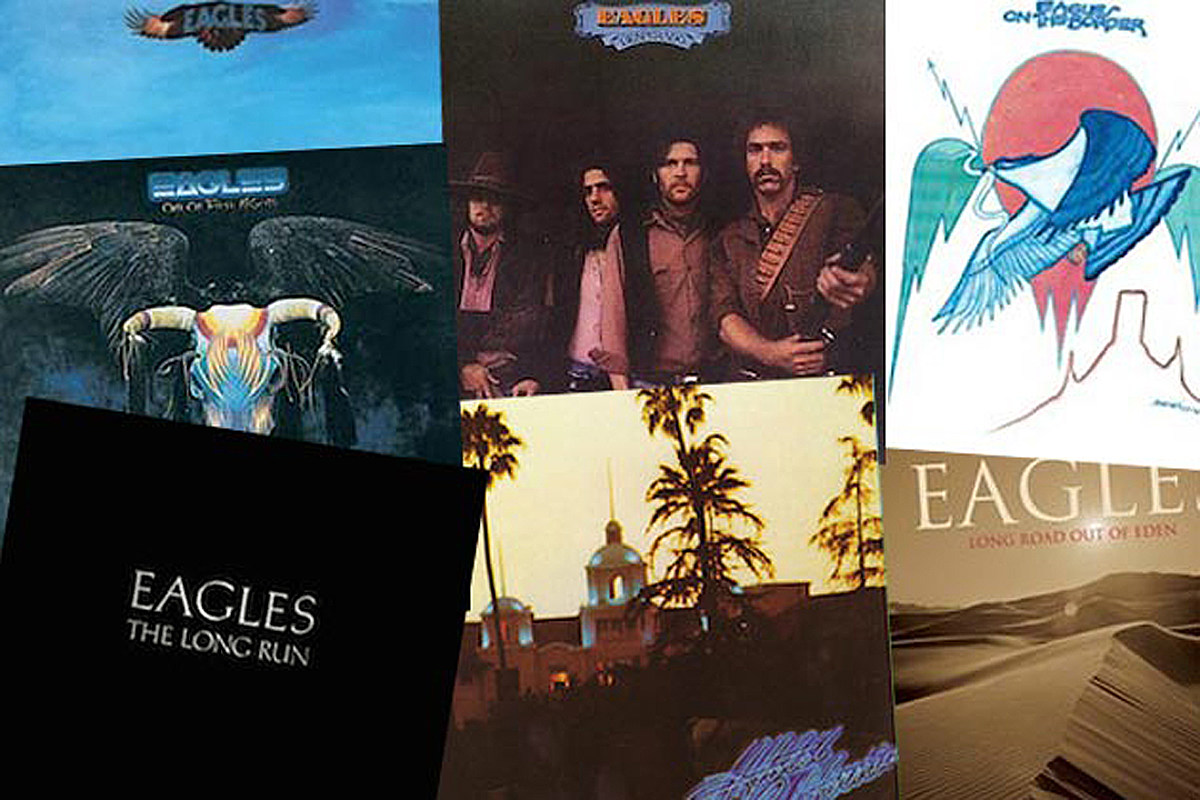As the faces of the Eagles, Glenn Frey and Don Henley produced songs that have been examined, celebrated and played over and over again. So, maybe it’s of little surprise that our list of Underrated Eagles Songs most often focuses on the work of other band members.
Songs by Frey and Henley – including all five of the group’s Billboard chart-topping smashes – never get overlooked. If anything, they’re ubiquitous: In 2018, the BBC reported that “Hotel California” airs on U.S. radio every 11 minutes. (Remember, the song itself is 6:30 long.)
We’re instead excavating six often-forgotten tracks from other current and former band members, including three by Randy Meisner, two from Bernie Leadon and one by Joe Walsh. These contributions span the length of the Eagles’ recording career, from their first self-titled album through 2007’s Long Road Out of Eden, presumably their last in the wake of Frey’s 2016 death.
As we dug deeper into the band’s catalog, another anomaly emerged: Some of their lesser-known singles have essentially vanished, as radio programmers, cover bands and streamers focus so intently on the Eagles’ biggest hits. Two other tracks on our list became stand-alone releases, but seem to have gotten lost in the shuffle over the years.
Good news: With roughly 4:30 to spare between broadcast spins of “Hotel California,” you could actually fit in several of these underrated moments – including selected cuts from 1972’s Eagles, 1974’s On the Border, 1980’s Eagles Live and 1994’s Hell Freezes Over.
Below, we dig deeper into the Most Overlooked Song on Every Eagles Album.
“Train Leaves Here This Morning”
From: Eagles (1972)
“Train Leaves Here This Morning” eventually became something of a signature moment for Bernie Leadon, who was revisiting a song he co-wrote with Byrds co-founder Gene Clark for 1968’s brilliant but commercially disappointing Fantastic Expedition of Dillard & Clark. By the time Leadon became part of the Eagles’ first lineup, after a similarly ignored detour in the Flying Burrito Brothers, country rock was no longer the outlier it had once been – and this song was born anew.
“Bitter Creek”
From: Desperado (1973)
Leadon wrote and sang the album’s final original track before the “Doolin-Dalton”/”Desperado” reprise closes out Desperado. “Bitter Creek” begins just as you’d expect from the Eagles’ stalwart traditionalist: reserved country rock. Maybe too reserved, actually, but then something happens about three minutes in, as the rest of the group joins Leadon’s wordless harmonizing on the outro. “Bitter Creek” takes flight.
“Is It True?”
From: On the Border (1974)
Randy Meisner’s growth as a songwriter is one of the Eagles’ intriguing secondary storylines. “Is It True?” was the first hint that he could more fully emerge from behind the long shadows of Glenn Frey and Don Henley, as Meisner offered a lovelorn, nearly complete ballad. He left in an unfortunate line about chainsaws during the middle eight, but Frey – in a preview of great moments like “I Can’t Tell You Why” – saves things with a sharply drawn turn on lead guitar.
“Too Many Hands”
From: One of These Nights (1975)
Meisner co-wrote this smart twist on an old religious trope with Don Felder, who’d just become an official member of Eagles. In keeping with Felder’s arrival, “Too Many Hands” also takes one of the final long strides away from the pastoral country-rock sound that had previously dominated the band’s earlier albums. Felder tangles with Glenn Frey on a dueling guitar-dominated outro, while Don Henley happily bangs away on the tabla.
“Try and Love Again”
From: Hotel California (1976)
Some days, this tucked-away Randy Meisner cut feels like the best song on the Eagles’ most celebrated album. A soaring anthem about believing against all odds, “Try and Love Again” had an appropriate theme for the often-forgotten Meisner. Ultimately, however, he couldn’t live up to that promise. As the pressures of fame got to be too much, this became Meisner’s final co-writing credit – and his final lead vocal – with the group he co-founded.
“The Sad Cafe”
From: The Long Run (1979)
Despite reloading with Timothy B. Schmit, a malaise had crept in. The Long Run was dotted with halfhearted efforts before the Eagles finally righted things with the album-closing, very cinematic “The Sad Cafe.” In many ways, this song sets a template for Don Henley’s subsequent solo career, as he offers a darkly ruminative examination of love lost. But it wouldn’t have been such a fitting finale without Don Felder’s elegiac, utterly virtuosic turn on guitar.
“Seven Bridges Road”
From: Eagles Live (1980)
The band’s gorgeous harmonies on “Seven Bridges Road” belied what was really going on behind the scenes. Recorded live just days before their breakup, this tribute to an old Alabama country route written by singer-songwriter Steve Young became the Eagles’ final charting single until an unlikely early-’90s reunion – but only after they reportedly turned down a multimillion-dollar offer to add a couple of new songs to bolster this final concert recording. The template for their work was a remarkably similar 1973 version by Iain Matthews that was produced by Mike Nesmith of the Monkees.
“Learn to Be Still”
From: Hell Freezes Over (1994)
Also released as a single, but only after three others – including the humorless, painfully obvious lead-off song “Get Over It” – Don Henley’s moving ballad about centering yourself seems to have been largely forgotten somehow. Still, this message resonates across the ages, just as it presumably did back then for Henley’s restless cohort Joe Walsh. He memorably slipped into addiction during the group’s lengthy hiatus between 1980-94. So, when former Eagles bandmates came calling about a reunion, they had one caveat: He had to get sober. It saved Walsh.
“Last Good Time in Town”
From: Long Road Out of Eden (2007)
Joe Walsh wasn’t much of a presence on Eagles’ long-awaited studio follow-up to 1979’s The Long Run, singing on just two tracks. This is actually his only credited co-write, as he contributed the verses while longtime Eagles collaborator J.D. Souther crafted the chorus. Yet, “Last Good Time in Town” – with its chuckling tributes to the joys of home life after giving up the high life – sounds 100 percent Walsh. It was just the kind of wink and nudge the sometimes over-serious Long Road Out of Eden sorely needed.
Rock Music’s 25 Craziest Conspiracy Theories
Gallery Credit: Nick DeRiso
See Glenn Frey in 25 Interesting Rock Movie Facts




